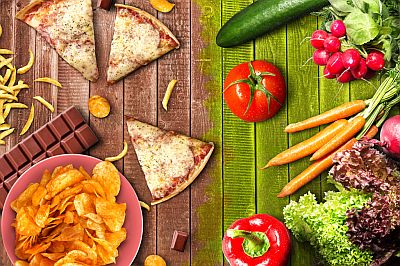It’s no secret that the food we eat can have a significant impact on our mental health, including our anxiety levels. Food and Mood. In this article, we will explore the connection between food and mood, and discuss practical strategies to break unhealthy eating habits and make better food choices that can help reduce anxiety. Look, it’s not going happen all at once. If you’re anything like me, no way am I going to ban pizza and cheesesteaks from my diet. However, modifying the frequency of those simple delicacies does have a positive impact.
Foods That Can Exacerbate Anxiety
When it comes to anxiety, certain foods can make symptoms worse. Some common culprits include caffeine, sugar, and processed foods. Caffeine is a stimulant that can increase heart rate, blood pressure, and anxiety levels. Similarly, consuming too much sugar can cause rapid fluctuations in blood sugar levels, leading to mood swings and increased anxiety. Processed foods are often high in unhealthy fats, artificial additives, and refined sugars, all of which can negatively affect mental health. Now processed foods is a big list and hard to avoid in our fast-paced world.
The List You’re Not Going to Like
- Canned fruits and vegetables
- Frozen meals
- Deli meats (ham, salami, bologna)
- Breakfast cereals
- White bread and pasta
- Instant noodles and soups
- Packaged snacks (chips, crackers, cookies)
- Sugary drinks (soda, fruit juice with added sugar)
- Candy and chocolate bars
- Packaged baked goods (cakes, pastries, muffins)
- Processed cheeses (cheese slices, cheese spreads)
- Condiments (ketchup, mayonnaise, salad dressings)
- Store-bought sauces and marinades
- Pre-packaged meals (microwave dinners, meal kits)
- Fast food items (burgers, fries, pizza)
It is important to note that not all processed foods are inherently unhealthy. Some minimally processed foods, such as canned beans, frozen vegetables, or whole-grain bread, can still be part of a balanced diet. The key is to limit the consumption of heavily processed foods that are high in unhealthy fats, added sugars, and artificial additives.
Steps to Break Unhealthy Eating Habits and Reduce Anxiety
The first step to breaking unhealthy eating habits and reducing anxiety is awareness. Identifying the specific foods that trigger or worsen your anxiety symptoms is crucial for making positive changes to your diet. Here are some practical tips to help you break unhealthy eating habits and improve your mental well-being.
Swap Stimulants for Calming Alternatives
If you find that caffeine increases your anxiety levels, try gradually reducing your intake and replacing caffeinated beverages with calming alternatives like herbal teas or decaffeinated coffee. Some popular herbal teas for anxiety relief include chamomile, lavender, and valerian root.
Opt for Nutrient-Dense Foods to Boost Mental Health
Incorporate nutrient-rich foods into your diet to support better mental health. Focus on consuming foods high in omega-3 fatty acids, magnesium, vitamin B6, and vitamin D, as these nutrients have been linked to reduced anxiety levels. Examples of such foods include fatty fish, leafy greens, nuts, seeds, and legumes. Here’s more detailed list of nutrient-dense foods.
- Fruits: berries, apples, oranges, bananas, kiwi, mango, and avocado
- Vegetables: leafy greens (spinach, kale, Swiss chard), broccoli, cauliflower, carrots, sweet potatoes, bell peppers, and tomatoes
- Whole grains: brown rice, quinoa, oats, barley, whole wheat, and whole-grain pasta
- Legumes: beans, lentils, chickpeas, and peas
- Nuts and seeds: almonds, walnuts, cashews, flaxseeds, chia seeds, and pumpkin seeds
- Lean proteins: poultry (chicken, turkey), fish (salmon, mackerel, tuna), eggs, and tofu
- Low-fat dairy products: yogurt, cheese, and milk (or fortified plant-based alternatives)
- Healthy fats: olive oil, avocado oil, nuts, seeds, and fatty fish
Maintain Stable Blood Sugar Levels
To avoid anxiety caused by unstable blood sugar levels, ensure you eat regular meals and snacks that combine complex carbohydrates, lean protein, and healthy fats. This balanced approach can help maintain steady blood sugar levels, leading to better mood regulation and reduced anxiety.
Stay Hydrated for Optimal Mental Health
Dehydration can negatively impact mood and anxiety levels, so it’s essential to drink enough water throughout the day. Aim for at least 8 cups (64 ounces) of water daily and consider increasing your intake if you’re physically active or live in a hot climate.
The Importance of Post-Exercise Nutrition
Proper nutrition after exercising is essential for replenishing energy stores, repairing muscle tissue, and promoting overall recovery. Consuming the right combination of nutrients can also help reduce inflammation and improve immune function. Here are some guidelines for what to eat after a workout to optimize recovery and support your mental well-being.
Be Patient and Persistent
Rome wasn’t built in a day; it was built brick by brick. Changing eating habits takes time, so be patient with yourself and remain persistent in your efforts. Celebrate small victories along the way and remember that every positive change you make to your diet can contribute to improved mental health and reduced anxiety.
Some Healthy Choices and Decisions
Understanding the link between food and anxiety is crucial for breaking unhealthy eating habits and making better dietary choices. By incorporating nutrient-dense foods, and maintaining stable blood sugar levels, you can reduce anxiety and improve your overall mental well-being.
Sources:
- Lakhan, S. E., & Vieira, K. F. (2010). Nutritional and herbal supplements for anxiety and anxiety-related disorders: systematic review. Nutrition Journal, 9, 42. [https://www.ncbi.nlm.nih.gov/pmc/articles/PMC2959081/]
- Selhub, E. (2015). Nutritional psychiatry: Your brain on food. Harvard Health Blog. [https://www.health.harvard.edu/blog/nutritional-psychiatry-your-brain-on-food-201511168626]

